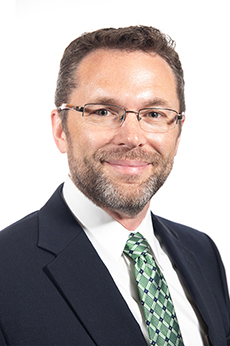
Dr. John Lach officially began his role as dean of SEAS on August 15, but he was hard at work for several weeks prior to that, meeting with leaders across GW and SEAS. “There’s tremendous opportunity here, and as the dean I want to help facilitate those opportunities for all SEAS stakeholders,” he says.
A former University of Virginia professor of electrical and computer engineering, Dean Lach comes to SEAS with extensive experience in developing cross-cutting initiatives and a long-standing interest in promoting interdisciplinary partnerships between engineers and others in the academic, business, government, and research communities.
His interest in taking a broader approach to engineering dates back at least to his undergraduate days, when he studied an interdisciplinary degree program at Stanford University called Science, Technology, and Society. “I’ve always been interested in the relationship between engineering and societal issues, so to be able to major in that as an undergraduate was something that very much shaped my approach to research and education,” he recalls.
As a professor and department chair at the University of Virginia, he further developed this approach by connecting his own research and that of his department to other strengths around the university. In his own research, he worked closely with others outside of his field to develop sensor systems for a variety of applications, but especially for health applications.
At SEAS, he’d like to bring that same interdisciplinary approach not just to research but to the classroom, too. “I see the future of engineering as being something that’s more integrated with other disciplines, and the engineers we’re educating need to be exposed to social sciences, policy, international affairs, health, business, and other areas in which GW has historic world class strengths," he says. He looks forward to developing new opportunities for SEAS students to integrate more social sciences and humanities into their studies; and in line with GW President Thomas LeBlanc’s desire to increase the percentage of GW students who study STEM fields, he also advocates exposing other GW students to engineering.
As he takes inventory of the school’s many strengths, Dean Lach notes the strong sense of community within SEAS, stating, “One of the things that drew me to SEAS was the really strong sense of community that exists in the school. It’s cultivated and it’s very intentional.”
He also appreciates the efforts SEAS has made to become a leader in women in engineering. “I am a big believer that diversity in thought and perspective is critical to solving the global grand challenges. It doesn’t just require diversity of disciplinary expertise, but also diversity of perspective and life experience,” he remarks.
Dean Lach believes deeply in the beneficial impact that engineers and computer scientists can make on society, and he thinks SEAS is positioned to make big contributions. “One of the things I’m impressed with as the new dean is the school’s operations. It’s an exceptionally well run school, and it’s very well positioned now to carve out areas where we can truly be world-class leaders in terms of research, education, and societal impact,” he states.

